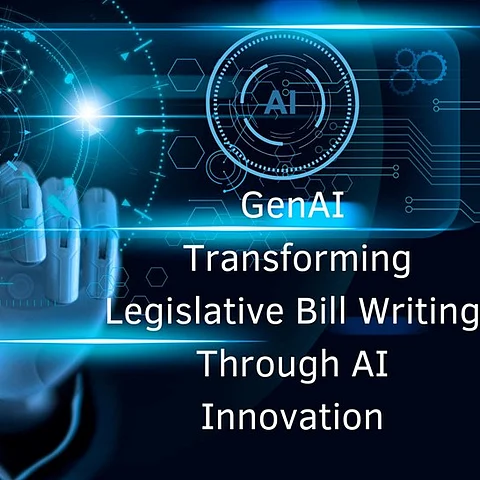

In the evolving landscape of governance, technological advancements are playing a crucial role in shaping legislative processes. Ashrith Reddy Mekala, a renowned expert in artificial intelligence, explores the transformative impact of Generative AI (GenAI) in legislative bill writing. His research highlights how AI-driven solutions are enhancing efficiency, accuracy, and consistency in law-making while allowing policymakers to focus on substantive legal matters.
The parliamentary process involves inefficiencies, ranging from lengthy consultation periods to legal terminologies inconsistencies. Traditional drafting techniques involve repeated back-and-forth critiques and revisions, leading to major delays. The drafting process is greatly accelerated with GenAI. Natural language processing (NLP)-enabled AI systems can review and produce legal documents while ensuring compliance with regulatory systems, cutting drafting times by up to 40%.
Perhaps one of the most important aspects GenAI brings is its precision in keeping to established legal frameworks. AI-powered drafting platforms can compare thousands of documents, detecting inconsistencies and ensuring new bills are consistent with the current laws. Latest implementations have shown enhanced conformity accuracy up to 92%, reducing the occurrence of drafting inaccuracies and regulatory inconsistencies.
Legislative drafting is a tremendous amount of administrative labor, ranging from document formatting, checks for terms, and structural coherence evaluation. GenAI mechanizes these tedious tasks, and legal experts are able to dedicate more time to policy formulation and stakeholder outreach. Through the use of AI-powered tools, legislative personnel have managed to minimize the time required for technical documentation work by as much as 60%.
In multilingual governance systems, consistency in terminology across different language versions of a bill is a persistent challenge. AI models trained on extensive legal datasets can ensure uniformity across multiple languages, improving terminological consistency by nearly 96%. Additionally, GenAI’s ability to process different legal frameworks simultaneously makes it invaluable in jurisdictions requiring cross-referencing of multiple regulatory codes.
In addition to writing, AI is also revolutionizing legislative design with predictive modeling. Through examining large sets of past legislative information, GenAI can predict the likely effect of pending legislation, highlighting areas that might need more examination before passage. Such findings improve decision-making by giving legislators a data-informed sense of the social and economic effects of pending bills.
Though its benefits, the use of AI in lawmaking requires stringent ethical controls. Transparency, avoiding biases, and human oversight are still paramount in AI-assisted government. The drafting tools that use AI are made to serve as facilitating technologies, not substitutes for human discretion. Policymakers still have the central role of reviewing and approving AI-generated drafts for conformity to ethical and legal considerations.
With the nature of legislative content being sensitive in nature, AI-governance security is highly important. AI generative systems have sophisticated encryption methods, access controls, and real-time scanning to safeguard legislative information from online attacks and data breaches. Such systems constantly review vulnerabilities, effectively preventing risks in advance before they become major problems. AI-enabled risk assessment mechanisms also ensure diligent compliance with data protection regulations, ensuring transparency and accountability in electronic governance.
By combining strong cybersecurity protection with AI functionality, governments can secure key legislative processes while tapping into the efficiency of AI, finally creating a more safe, resilient, and reliable digital governance landscape.
With further advancements in AI, its role in governance will stretch even wider than legislative drafting to include regulatory compliance tracking and instant policy analysis. Advanced AI systems will soon be able to provide legislators with advanced simulations of the long-term societal, economic, and environmental effects of pending bills. This would enable more evidence-based decision-making, limiting unintended consequences and enhancing policy effectiveness.
Furthermore, ongoing advancements in machine learning and AI ethics will ensure that the implementation is done responsibly, minimizing bias and increasing transparency. Consequently, AI will be a ubiquitous aid in public sector innovation, propelling more efficient, well-informed, and responsive governance.
In conclusion, the integration of Generative AI into legislative processes marks a significant paradigm shift in modern governance. By enhancing automation, accuracy, and predictive insights, AI is revolutionizing legislative drafting while ensuring essential human oversight. Ashrith Reddy Mekala’s research highlights the transformative potential of GenAI in shaping public policy and regulatory frameworks. As AI adoption continues to expand, its role in governance will evolve further, fostering more efficient, transparent, and effective legislative processes.
